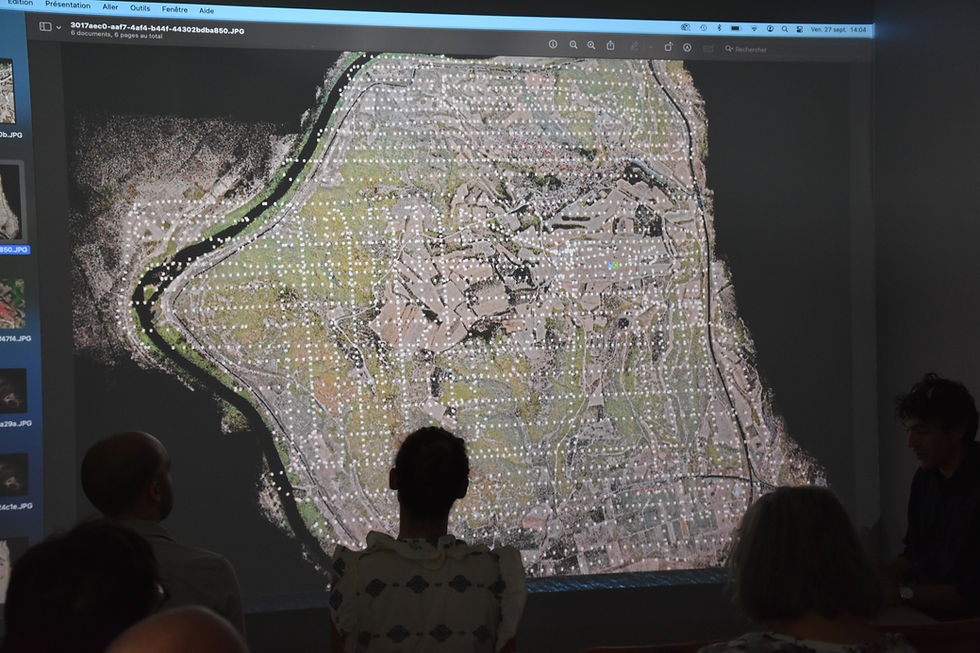The Hellenic Police and the Protection of Cultural Heritage
- michaelculture

- Feb 19, 2025
- 3 min read
Interview of Police Officer George MALLOS, Head of the Department for the Protection of Cultural Heritage and Antiquities, Thessaloniki Security Directorate
Following ANCHISE First Demonstration in Thessaloniki (Greece), Police Officer George MALLOS, Head of the Department for the Protection of Cultural Heritage and Antiquities, agreed to answer ENSP’s questions. Read below and learn more about the fight against looting and trafficking from Law Enforcement Agencies’ perspective!

The Unit and Law Enforcement Agencies:
Can you please introduce yourself, introduce the Police Department of Cultural Heritage and Antiquities of Thessaloniki (Greece), its missions, and specificities?
My name is George Mallos, and I am an Officer of the Hellenic Police, serving as the Head of the Department for the Protection of Cultural Heritage and Antiquities within the Thessaloniki Security Directorate. Our department's mission is to prevent, suppress, and investigate crimes related to cultural heritage, including the illicit trafficking of antiquities and the protection of historical artifacts and sites. This specialized unit focuses on safeguarding Greece’s invaluable cultural heritage. Our work encompasses the identification and recovery of stolen artifacts, the prevention of illegal excavations, and collaboration with international organizations to combat the trafficking of cultural goods. Thessaloniki, as a city rich in history, presents unique challenges and opportunities for our mission, requiring close cooperation with archaeologists, historians, and legal experts.
We can sometimes hear that looting and trafficking heritage is a “harmless offence.” What would you answer?
This perception is profoundly misleading and dangerous. Looting and trafficking of cultural heritage deprive societies of their history, identity, and cultural continuity. Such crimes are often linked to organized crime networks, funding other illicit activities, including terrorism. Moreover, the irreversible damage to archaeological sites and the loss of cultural context impoverish humanity as a whole. Protecting heritage is not just a legal responsibility but a moral imperative.
We know that cultural goods are stolen in multiple countries and sent worldwide. Can you describe the international cooperation with other law enforcement agencies?
International cooperation is pivotal in combating the trafficking of cultural heritage. We work closely with INTERPOL, EUROPOL, UNESCO, and national police forces across Europe and beyond. Sharing intelligence, conducting joint operations, and utilizing databases such as INTERPOL’s Stolen Works of Art are vital tools. These collaborations enable us to trace stolen artifacts, disrupt smuggling networks, and repatriate cultural goods to their rightful owners.
“Protecting heritage is not just a legal responsibility, but a moral imperative.”
Cooperation with ANCHISE
Why did the Thessaloniki Police decide to answer positively to ANCHISE’s request and to get involved in this European project?
The Thessaloniki Police Department recognized ANCHISE as an invaluable initiative aligning with our goals of enhancing cultural heritage protection. By participating, we aimed to contribute our expertise while benefiting from innovative tools and methodologies to improve our operations. ANCHISE represents a unique opportunity to strengthen our capacities and deepen our collaboration with European counterparts.
What are your expectations regarding the tools developed by the ANCHISE project?
We anticipate that ANCHISE will provide advanced technological tools, to identify and document illicit activities more effectively. These tools can significantly enhance our ability to monitor archaeological sites, analyze data, and respond swiftly to threats. Furthermore, we hope the project fosters knowledge sharing and best practices among European partners.
According to you, what are the gaps to be filled in the future?
One of the main gaps is the need for more robust international legal frameworks to address the complexities of cultural heritage trafficking. Additionally, there is a need for greater public awareness campaigns to highlight the importance of cultural heritage protection. Investment in advanced technologies and increased funding for specialized training for law enforcement agencies are also essential.
Are there some books, movies, or resources, in Greek or another language, that you would recommend to the general public to better understand the protection of cultural heritage?
I would recommend "The Destruction of Memory" by Robert Bevan, which explores the deliberate destruction of cultural heritage as a weapon of war. In Greek, "Η Κλοπή των Πολιτισμών" by Nikos Kaltsas provides valuable insights into the history and challenges of antiquities trafficking. Documentaries such as "The Rape of Europa" are also excellent resources for understanding the global significance of cultural heritage preservation.



